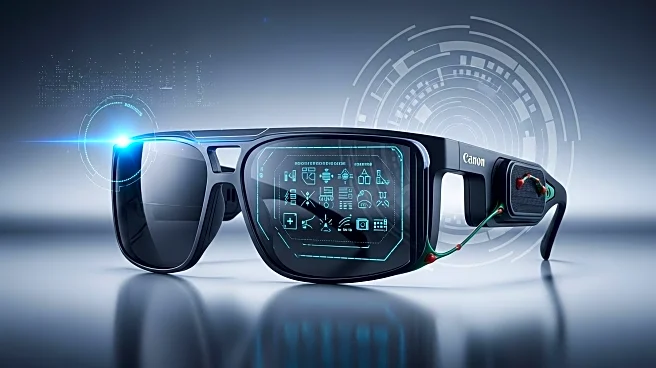What's Happening?
Meta has introduced its latest innovation, the Ray-Ban Display smart glasses, which now feature an integrated screen. This development was announced at Meta Connect 2025, marking a significant upgrade from the first-generation Ray-Ban smart glasses that lacked a display. The new glasses offer a full-color heads-up display (HUD) for notifications, navigation, and multimedia content. Weighing 69 grams, they are slightly heavier than their predecessors but remain comfortable for users. A key feature of these glasses is the Meta Neural Band, a wristband that uses sEMG technology to interpret hand gestures as inputs, allowing users to interact with the glasses' interface through pinches, swipes, and wrist movements. This technology aims to enhance user experience by providing intuitive control over the device's functions.
Why It's Important?
The introduction of the Ray-Ban Display smart glasses represents a significant advancement in wearable technology, potentially transforming how users interact with digital content. By integrating a screen and a responsive control system, Meta is positioning itself as a leader in the smart glasses market. This innovation could impact various sectors, including navigation, photography, and communication, by offering hands-free access to information and services. The Neural Band's ability to interpret gestures could pave the way for more seamless human-computer interactions, influencing future developments in augmented reality and wearable tech. As these glasses become more widely adopted, they could drive changes in consumer behavior and expectations regarding personal technology.
What's Next?
Meta plans to continue enhancing the functionality of the Ray-Ban Display smart glasses, with future updates potentially including a handwriting feature. The company is also exploring applications for accessibility, such as live transcription and translation capabilities, which could broaden the glasses' appeal to diverse user groups. As Meta refines the technology, it may face competition from other tech companies seeking to enter the smart glasses market. The success of these glasses will likely depend on user adoption and feedback, which could influence Meta's strategy in developing subsequent iterations of the product.
Beyond the Headlines
The development of the Ray-Ban Display smart glasses raises questions about privacy and data security, as the device's capabilities could lead to concerns about surveillance and data collection. Additionally, the integration of a screen in everyday eyewear may prompt discussions about the impact of constant connectivity on mental health and social interactions. As wearable technology becomes more prevalent, society may need to address these ethical considerations to ensure responsible use.










